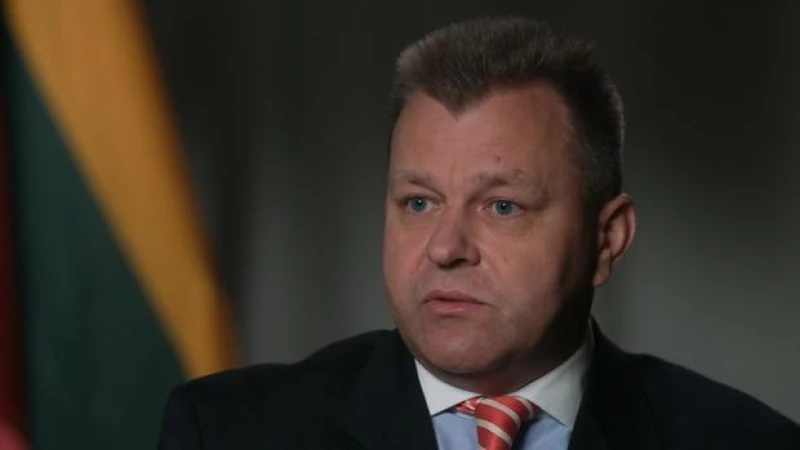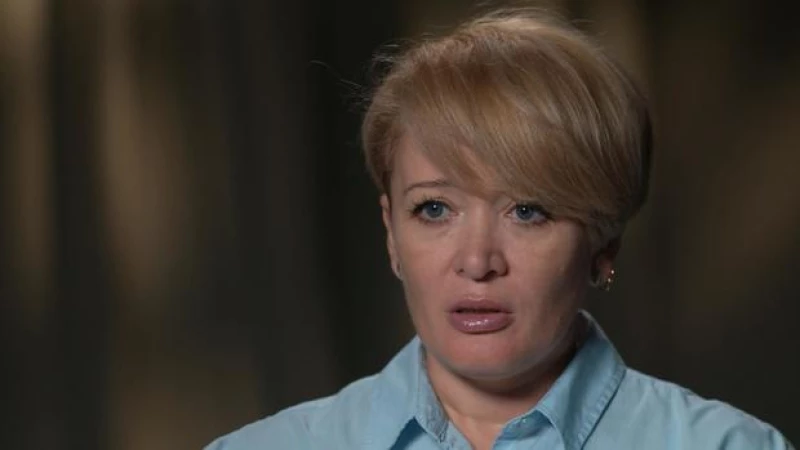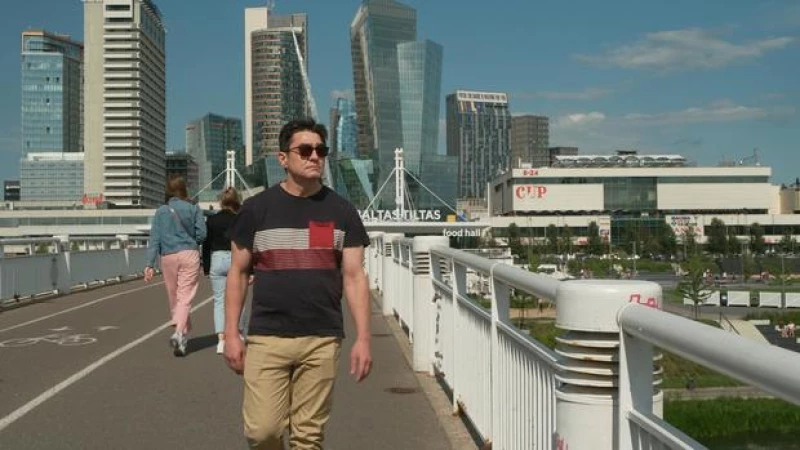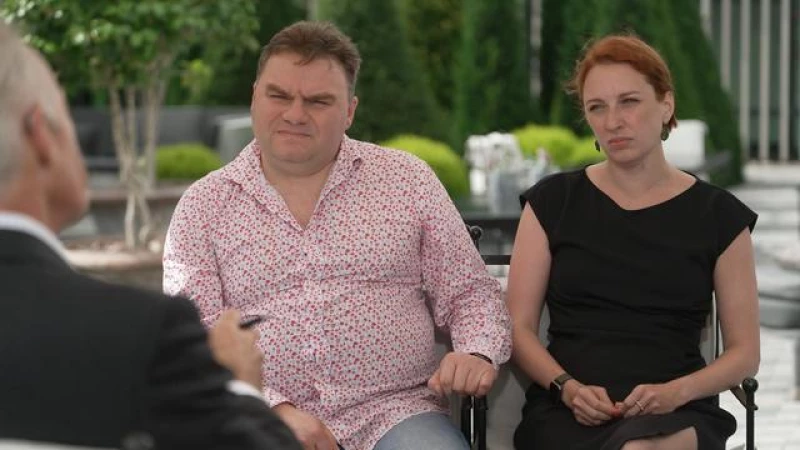Today is election day in Russia but there's no suspense. 71-year-old Vladimir Putin will be named the winner as he has been over the last 24 years. This time, as often, his challengers died; one, after an explosion on a plane and, Alexey Navalny, Putin's leading rival, who died last month in an Arctic prison camp. Putin has killed nearly all internal opposition to his unprovoked war in Ukraine. And yet, many courageous Russians continue the struggle outside the country. We met some of them in a city you might think of as the capital of free Russia.
It's 500 miles west of Moscow, the city of Vilnius, in Lithuania where there is no love lost for Russia.
Lithuania is a democracy of about 3 million people and a NATO ally. Vilnius, the capital, is clothed in the colors of Ukraine. The city changed the Russian embassy's address to "Heroes of Ukraine Street." And Putin is reminded the international court in the Hague is waiting with his arrest warrant. Since Putin's 2022 invasion, Lithuania has welcomed more than 2,500 Russian exiles.
Mantas Adomenas: It is our policy to provide shelter to all freedom fighters.
Mantas Adomenas served as Lithuania's deputy foreign minister from 2020 until last August.
Scott Pelley: I haven't seen so many Ukrainian flags since I was in Kyiv. Why do your people feel so strongly about this?
Mantas Adomenas: Our freedom, our independence, our sort of security is being defended in the battlefields in Ukraine. Ukrainians are dying so that we can be safe.
Scott Pelley: There are many more Russian dissidents who would like to come to Lithuania. Can you accept any more?
Mantas Adomenas: Yes, I think we can accept. Of course— we will accommodate as many as needed and to provide them with possibility to work for the freedom and democracy in Russia.
One of the Russian exiles, in Lithuania, working for freedom and democracy is a crusading mom. Two years ago, Anastasia Shevchenko fled Putin's regime.
Anastasia Shevchenko: This is a terrorist regime. They are threatening other countries with oil, gas, nuclear weapon, and grain. They are threatening us with our children, with our parents, with our lives, and so on.
More than anything, it was her daughter, Alina, severely disabled at birth, that made Shevchenko an activist against Putin. Back then, the family was in southern Russia and Alina was in a Russian government nursing home.
Scott Pelley: Alina could not speak, could not communicate?
Anastasia Shevchenko: No. She was like a one-week child, like a baby. She was 17, but even, you know, to feed her, it was a whole science, because she needed blended food. You need to hold her in a special position.
Shevchenko cared for Alina much of the time because the Russian nursing facility was short on staff and supplies.
Anastasia Shevchenko: I was struggling to get medication for my daughter, begging in the pharmacy that she needed it. It was very important for her health. They said, "No, we just don't have it, because the ministry forgot to order it this month and you need to wait." I decided, I'm not going to keep silence. I'm going to stand out and to speak out.
She spoke out through a Russian democracy group called Open Russia. It was tolerated 10 years ago and Shevchenko organized protests in her hometown. But in 2019, the Kremlin cracked down. Shevchenko was arrested and her lawyer warned her she would be shocked by what the police had already done.
Anastasia Shevchenko's Harrowing Tale of Surveillance and Tragedy
Shevchenko recalls the chilling moment when she discovered a video camera hidden in her bedroom, capturing her every move for six months. The invasion of privacy led to her house arrest, preventing her from caring for her daughter Alina, who tragically passed away from pneumonia while Shevchenko was unable to be by her side.

Despite being given a suspended sentence in 2021, Shevchenko's decision to flee Russia following Putin's invasion of Ukraine speaks volumes about the oppressive state of the country. The constant surveillance and control over citizens, as Shevchenko describes, have forced many like Sergei Davidis to seek refuge elsewhere.
Shevchenko's Warning about Russia's Surveillance State
Shevchenko's chilling account serves as a stark warning about the extent of surveillance and control in Russia today. Merely posting on social media or speaking out can lead to imprisonment, highlighting the pervasive atmosphere of fear and monitoring that grips the nation.
Scott Pelley: You would be in a Russian prison just for doing this interview.
Sergei Davidis: Oh, for sure, for sure
In Moscow, Davidis helped lead one of Russia's largest human rights groups called Memorial. It won the Nobel Peace Prize two years ago but now it's banned. He told us…
Sergei Davidis (translation): Almost every day there are more and more arrests. We hear news about new political arrests. And apart from the legal side of it, more often than before, there's violence and torture.
Davidis heads Memorial's project to support political prisoners. He told us he has confirmed 680 in prison today but he believes the actual number is multiples of that. Since 2022, Russians can be sentenced to 15 years just for criticizing the war-- on the street or in the media.
Sergei Davidis (translation): One of the consequences of the war was a complete wipe out of independent mass media, a prohibition of any opinion that's not under control of the government.

Tatyana Felgenhauer and Aleksandr Plyuschev: Voices of Truth in Times of War
As the war in Russia escalated, talk radio hosts Tatyana Felgenhauer and Aleksandr Plyuschev found themselves facing a stark reality. Their once-prominent Moscow station was silenced by the government, leaving them with no platform to speak their minds.
Undeterred, Felgenhauer and Plyuschev took to the internet, streaming daily from Vilnius into Russia via YouTube. In a time where dissenting voices are suppressed, they saw this as their only chance to provide honest commentary on the war.
Speaking about the importance of their work, Felgenhauer emphasized, "This is the only chance to talk about the war honestly because the propaganda tries to create this feeling that you are completely alone if you are against the war."
Despite facing immense pressure and censorship, these brave individuals continue to stand up for the truth, refusing to be silenced or complicit in spreading false narratives.
Defying Censorship: A Beacon of Truth from Lithuania
Amidst a media landscape dominated by Kremlin propaganda, a Lithuanian station has emerged as a beacon of truth for a captive Russian audience. While Russian radio and TV stations toe the government line, this station on platform number 5 has been fearlessly presenting the facts.
With images and reports being tightly controlled within Russia, platforms like these play a crucial role in ensuring that information flows freely and that alternative viewpoints are heard.

For those like Tatyana Felgenhauer and Aleksandr Plyuschev, the choice to speak out is clear. In a climate of fear and censorship, their voices serve as a reminder that the truth will always find a way to break through the silence.
Because part of Russia, Kaliningrad, on the left, is separate, like Alaska from the lower 48, the Moscow-Kaliningrad train must travel through Lithuania.
The cars are sealed for the transit but at a stop in Vilnius, Russian passengers were confronted by posters of atrocities. Each read, "Putin is killing civilians in Ukraine. Do you agree with this?" The gallery testified as the train waited half an hour. There's no way to know how much truth climbed aboard. And no one is allowed off the train, in part, because Lithuania worries about Russian agents.
Scott Pelley: Putin is infamous for attempting to attack his enemies in foreign countries. And I wonder if the Russian dissidents are safe here in Lithuania.
Mantas Adomenas: Of course, it is a major concern for us. And we spend considerable-- effort in-- in making sure that-- dissidents are safe here and-- safer than they would be, in fact, in-- in many other countries.
Scott Pelley: Have there been attempts?
Mantas Adomenas: Well, I'm afraid I can't release that information in more detail. But-- let's put it this way-- that-- that Russia is constantly probing and constantly trying.
And this past week, Russia may have gotten through. Leonid Volkov was attacked with a hammer outside Vilnius. Volkov, on the right, was a top aide to Putin's late rival Alexey Navalny. Volkov's arm was broken. The attacker fled.
Vladimir Putin's re-election this week will bring him to his fifth term, which will cover the next six years. He enjoys support from nationalists who want to believe that today's Russia is an exceptional nation. But Putin also has weaknesses. It's estimated he's lost 300,000 troops killed and wounded and Russia has a population less than half that of the United States and an economy about the size of Italy's.
Anastasia Shevchenko: My hope is-- a country where a government takes care about citizens.
Anastasia Shevchenko is free in Vilnius but she's wanted in Russia for breaking her probation. These days she's streaming her own YouTube show and sends medicine, food and letters to political prisoners. She's become another voice to the isolated and the lonely and those, like her daughter, who will never escape the new iron curtain.
Anastasia Shevchenko: She was alone, no one next to her. I really feel very guilty about it. But I wouldn't change anything in my life, I think.
Scott Pelley: Why not?
Anastasia Shevchenko: In Russia, the foundation of society is built on deception. We are surrounded by a facade of fake democracy, fake news, and fake elections. I strive to embody the opposite - transparency and openness. My vision is for Russia to embrace honesty and openness in all aspects.
Produced by Henry Schuster. Associate producer, Sarah Turcotte. Broadcast associate, Michelle Karim. Edited by Michael Mongulla.







